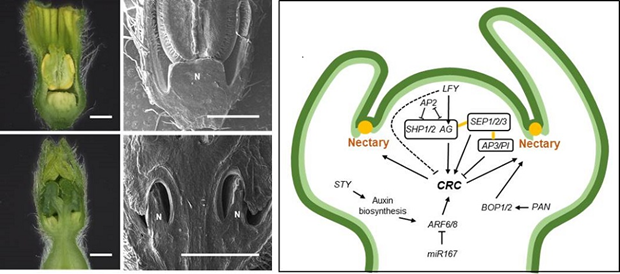Genetic control of nectary development
Can we imagine the world without chocolate, coffee or vanilla ice cream, three goods derived from crops that depend on pollinators! In fact, animal pollinators are vital for life on earth.
Insect pollinators are also a key to agriculture, contributing to the production of most fruits and vegetables necessary for healthy human diets. Over the last decades, there is mounting evidence of pollinator decline all over the world and consequences in many agricultural areas could be a major threat (Future Brief 23. produced for the European Commission DG Environment (2020).
Since bees prefer flowers with larger rewards, usually in the form of pollen and nectar, investigating nectar related traits including nectary development and nectar secretion will be key to develop “pollinator friendly” cultivars that not only increase yield and its stability but also contribute to the rewarding and the preservation of the bees.
Filip Slavkovic is a member of the "Sex Determination and Carpel Development" team, headed by A. Bendahmane at IPS2. In the framework of his thesis work, he reviews the roles and interactions of key genes controlling nectary development and recent inspiring findings regarding the gene networks regulating nectary maturation and nectar secretion, in various plant species. He also raises key questions that need to be addressed to develop crop ecological functions that take into consideration pollinators’ needs.

Figure: Left panel, transversely dissected flower of melon (Cucumis melo) prior to anthesis. Nectary develops as a single dome-shaped structure at the base of the male flower, while it completely encircles the stigmatic tissue of the female flower. Right panel, synthetic model of genetic control of nectary development.
